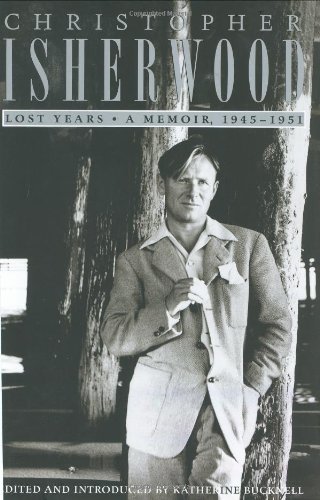
Lost Years
A Memoir 1945 - 1951
فرمت کتاب
ebook
تاریخ انتشار
2007
نویسنده
Christopher Isherwoodناشر
HarperCollinsشابک
9780061370649
کتاب های مرتبط
- اطلاعات
- نقد و بررسی
- دیدگاه کاربران
نقد و بررسی

September 4, 2000
English expat novelist and autobiographer Isherwood (1904-1986) may be best known for The Berlin Stories, the basis for the musical Cabaret; he spent most of his later life in southern California, where his productions included the groundbreaking gay-themed 1976 memoir Christopher and His Kind. Bucknell edited Isherwood's Diaries Volume One 1939--1960, which appeared in America in 1997; those diaries gave day-by-day accounts of Isherwood's WWII years and the '50s, but left the time in between sparsely covered. Begun in the 1970s and perhaps unfinished, this long, intimate, sometimes repetitive book was Isherwood's attempt to reconstruct those seven years; it takes the form of third-person diary entries ("On February 25, Christopher drove to Los Angeles"; "On September 6, Christopher went down to Trabuco"; and so on). During those years, "Christopher" investigated psychic powers and Indian mysticism; visited England, Italy, South America and New York; made contacts in the world of Hollywood film; worked on novels and autobiographies; and maintained a serious, if troubled, romance with William Caskey, with whom he lived for much of that time. The book is notable throughout for its portrayals of sex, sexuality and pre-Stonewall gay identity. It stands out, too, for its wealth of highbrow celebrities: prose writers E.M. Forster, Aldous Huxley and Ana s Nin; poet W.H. Auden; and spy Guy Burgess are among the diaries' famous figures. Individual episodes (especially one surrounding Isherwood's surgery) can be touching, or funny, or both; the diary structure, though, prevents the book from acquiring momentum or shape. While it lacks the artfulness of the memoirs Isherwood chose to publish, it will nevertheless find grateful readers among those who care about his work.

October 15, 2000
Isherwood (1904-86), the author whose novels about pre-World War II Berlin led, most famously, to the Broadway smash hit Cabaret, referred to the current work as a "reconstructed diary." Using diary entries, appointment books, and correspondence, he attempted, some 30 years later, to record the life he lived from January 1945 to May 1951, a period that corresponds roughly with his liaison with photographer William Caskey. (Becoming busy with Christopher and His Kind, he never prepared The Lost Years for publication.) Centering on Isherwood's exploration of his homosexual identity, the book contains reflections on his romances, including graphic details of sexual encounters, as well as amusing anecdotes on friends and acquaintances in Hollywood, New York, and London. Katherine Hepburn, Charle Chaplin, Tennessee Williams, Gore Vidal, Norman Mailer, and E.M. Forster are but a few of the famous personalities that grace this memoir's pages. A nine-page chronology and a glossary of people, places, institutions, and Hindu religious terms are included. Highly detailed and heavily footnoted, this work will appeal chiefly to Isherwood scholars and more generally to students interested in gay studies. Recommended for academic libraries. [Previewed in Prepub Alert, LJ 3/15/00.]--William Gargan, Brooklyn Coll. Lib., CUNY
Copyright 2000 Library Journal, LLC Used with permission.

September 15, 2000
The esteemed British writer Christopher Isherwood (1904-86), who established American citizenship and spent the second half of his life as a resident of California, kept copious diaries, a first volume of which, covering 1939 to 1960, was published in 1996 as " Diaries: Volume One. "In 1971, Isherwood began work on a "reconstructed diary" to document his activities during the half-dozen years following World War II, a time when, more or less, he didn't keep his usual careful diary records. This reconstructed diary, "never completed by Isherwood but also never destroyed," as we learn in the editor's introduction, is now being published for the first time. It must be stated, first and foremost, that this volume is quite sexually graphic. At the time he was composing it, Isherwood was avowing his homosexuality; and, in fact, as Bucknell relates, gay liberation "was the only movement for social change to which Isherwood ever felt personally and entirely committed." These "sexual memories," as he calls them, amount to consequential reading for gaining a complete picture of an important writer.(Reprinted with permission of Booklist, copyright 2000, American Library Association.)

























دیدگاه کاربران